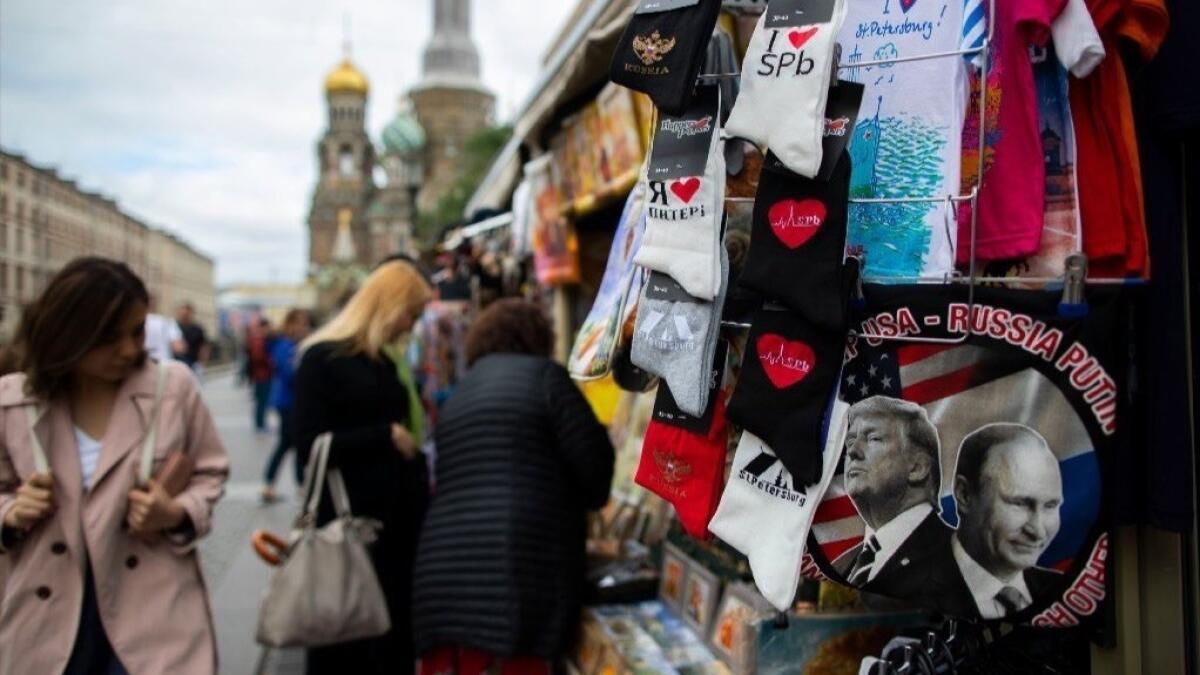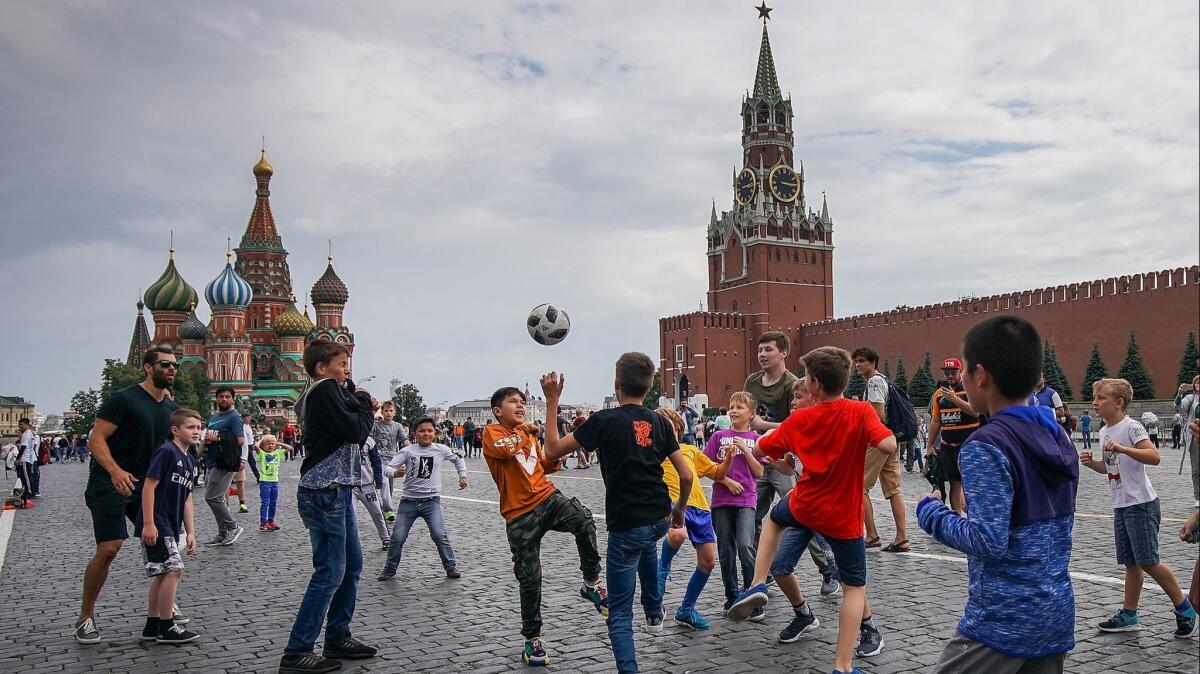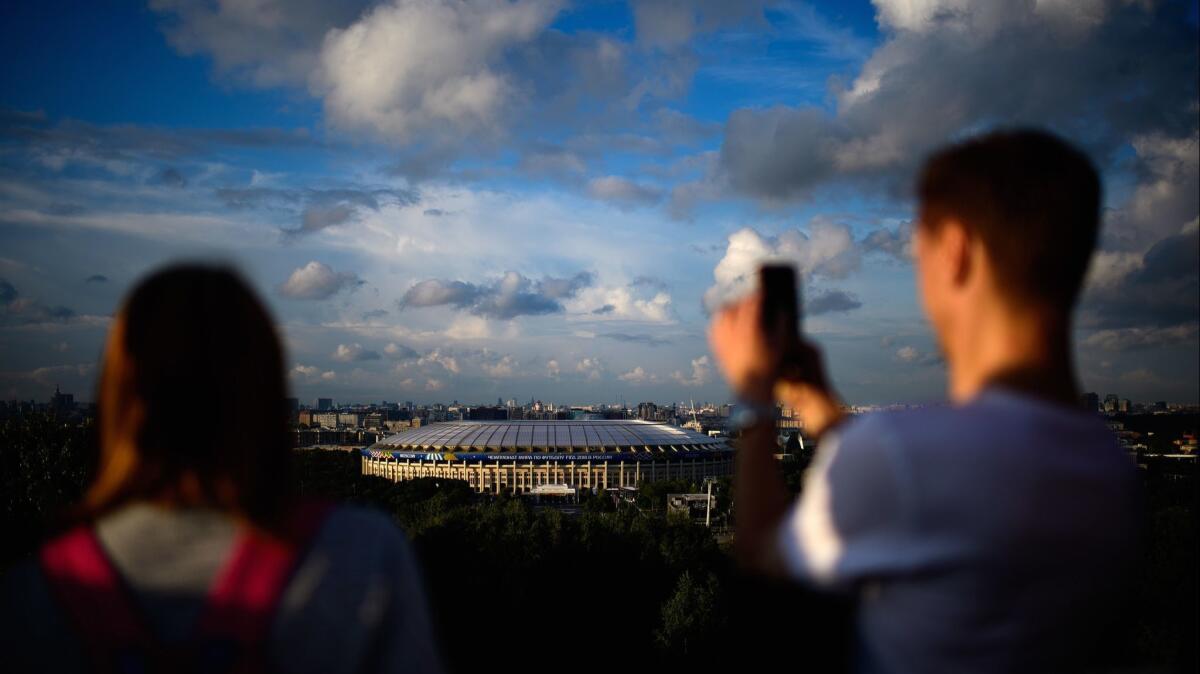World Cup gives Russia a global makeover, but how long will that last?

- Share via
Reporting from Moscow — The Russian soccer team may be out of the World Cup, but the Kremlin is winning when it comes to making over its global image.
By most estimates, Russia’s hosting of what’s likely to be the most watched sporting event of the year has been a success. Almost 1 million soccer fans traveled to Russia to see the games play out in 11 cities across the country, and social media has been flooded with scenes of massive street parties in Moscow and beyond.
The lowest ranked team at the start of the tournament, Russia made it to the quarterfinals after beating Spain, a powerful squad that won the World Cup in 2010. By doing so, a breath of patriotism and even a national hero — Russia goalkeeper Igor Akinfeev — emerged.
No one thought the party would be this good, not even the hosts.
“We wouldn’t have even played if we hadn’t been the host nation,” Anastasia Zakharova, 35, an IT specialist in Moscow, said the night Russia lost to Croatia. “The atmosphere has just been incredible. I didn’t even like soccer, but now we are watching every game. We’re all so proud of our boys.”
All this has given Russian President Vladimir Putin a fresh edge as he prepares to meet President Trump in Helsinki next week. He’ll arrive in the capital of Finland at a time when any negative world view of Russia has been muted by good news.
“It’s good to be seen as the center of the world for a while,” said Mark Galeotti, a senior research fellow at the Institute of International Relations in Prague in the Czech Republic, and an expert in Russian security and politics. “The World Cup has been rather successful in terms of being a soft power win, not just in terms of the fanfare, but also the coverage in press that says, ‘Russia isn’t such a horrible place after all.’”

The question now is will the Kremlin and Putin leverage or squander the positive PR.
“If Putin actually wants to use that soft power, then it also must become a constraint on his behavior,” Galeotti said.
But that’s unlikely, he added. For example, Russia isn’t likely to withdraw from eastern Ukraine, where the Kremlin has been backing separatist militias in a violent war with the Ukrainian government that has claimed more than 10,000 lives in four years, or from Syria.
“Will they try to capitalize on that [soft power] or, as is probably more likely, will they waste it with some other clumsy, aggression elsewhere?” Galeotti said.
The last time Russia and Putin saw such a positive boost in global perception was during the 2014 Winter Olympics in Sochi. Like the World Cup, negative press going into the Games painted a picture of an authoritative Putin overseeing the most expensive Olympics in history. There were media reports of corruption, nepotism and reckless spending.
In the end, though, Sochi was a success, and polished Russia’s image abroad.
But within days of the Olympic closing ceremony, masked Russian soldiers moved into Ukraine’s Crimean peninsula, which Moscow eventually annexed.
Western nations, including the U.S. and the European Union, called the annexation an illegal land grab and punished Russia with economic sanctions. The Kremlin’s relationship with the West soured while Putin insisted the world has been swayed by a U.S.-led, anti-Russia campaign designed to discredit an emerging, post-Soviet Russia.
Putin will arrive in Helsinki the day after the World Cup finals on July 15. Coming off of a successful tournament, Russia’s post-soccer image will make it “easier for Trump to make apologies before his critics to change the toxic atmosphere around Russia,” said Alexander Baunov, a senior fellow at the Carnegie Moscow Center.
“When you have only negative background in the media, it’s much more difficult for you to explain why you are meeting with Putin or why you are making concessions by talking to this guy,” Baunov said.
Even the latest allegations against the Kremlin, such as the death of a British woman who came into contact with the Soviet-made nerve agent Novichok, seem to be drowned out by World Cup euphoria.
“Even if Trump is uncharacteristically resolute and firm with Putin, and no great geopolitical shifts take place during the course of the summit, Putin wins,” said Nina Jankowicz, a Global Fellow at the Wilson Center’s Kennan Institute, a Washington think tank. “The very act of meeting will elevate Putin and Russia’s status, and provide him endless propaganda to boost his image at home.”

And he may need it.
While the excitement of the World Cup is dominating the headlines and brightening the mood, the Kremlin is facing backlash from an unpopular pension reform bill, which was quietly introduced into the parliament the day the World Cup opened.
The bill proposed raising the pension age for men from 60 to 65, and from 55 to 63 for women. Its lack of public debate has angered many Russians, who depend on the meager monthly payments to survive. Meanwhile, Putin’s domestic approval ratings have dropped 14 points to 64%, according to Russian polling agencies.
“Russians, they aren’t any more stupid than the rest of us,” Galeotti said. “They know that the World Cup was built on the basis of massive embezzlement and so forth. In that way, the Russians themselves paid for this party.”
Still, it has provided a feel-good moment.
“It’s not success just for Putin. He can be proud of well-organized games,” Baunov said. “It’s also a positive outcome for the average Russians.”
Twitter: @sabraayres
Ayres is a special correspondent.
More to Read
Sign up for Essential California
The most important California stories and recommendations in your inbox every morning.
You may occasionally receive promotional content from the Los Angeles Times.











